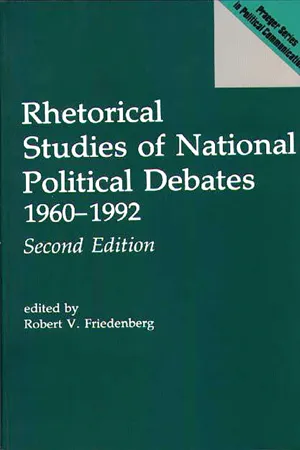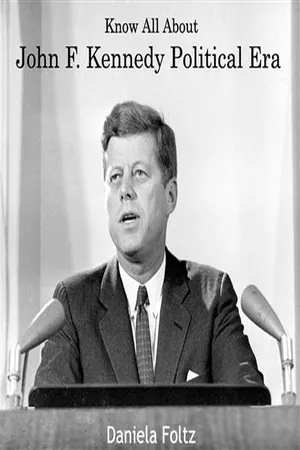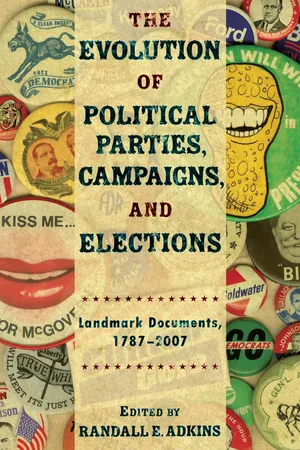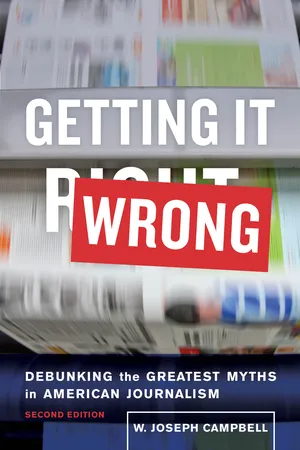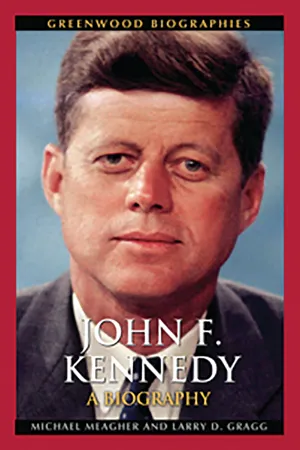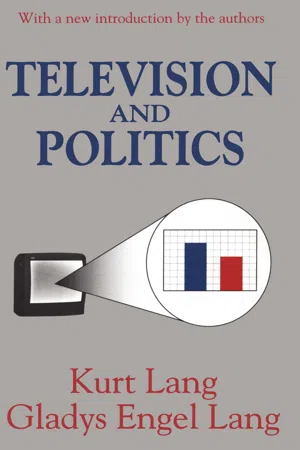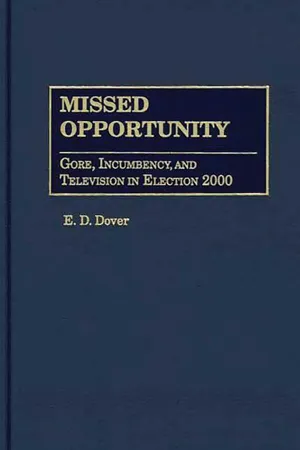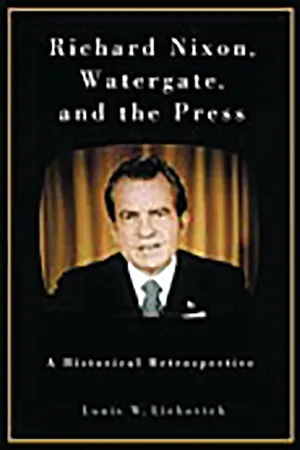History
1960 Presidential Election
The 1960 Presidential Election was a closely contested race between Republican candidate Richard Nixon and Democratic candidate John F. Kennedy. Kennedy ultimately won the election by a narrow margin, becoming the youngest president elected at the time. The televised debates between the two candidates were influential in shaping public opinion and are often cited as a key factor in Kennedy's victory.
Written by Perlego with AI-assistance
Related key terms
1 of 5
8 Key excerpts on "1960 Presidential Election"
- eBook - PDF
- Robert V. Friedenberg(Author)
- 1993(Publication Date)
- Praeger(Publisher)
Chapter 1 The 1960 Kennedy-Nixon Presidential Debates Theodore Otto Windt, J They were called the "Great Debates," although they were neither "great" nor "debates." 1 "They" were the four televised joint appear- ances of presidential candidates John F. Kennedy and Richard M. Nixon before different panels of journalists during the course of the 1960 pres- idential campaign. But Robert W. Sarnoff of NBC dubbed them the great debates, and the name stuck. The exact role and importance the 1960 debates played in the election of John Kennedy are subject to dispute. However, the belief that without the debates Kennedy could not have won is firmly established. In an election that was decided by only 0.2 percent of the popular vote (a margin of about 112,000 out of almost 69 million votes cast), every major event in the campaign was significant. And the debates between Ken- nedy and Nixon, especially the first debate, were crucial. Theodore H. White, the wisest observer of that election, remarked: "When [the de- bates] began, Nixon was generally viewed as being the probable winner of the election contest and Kennedy as fighting an uphill battle; when they were over, the positions of the two contestants were reversed." 2 Gallup Poll data support that conclusion. Going into the first debate, Gallup reported Nixon with a 47 to 46 percent lead in the polls. But after that debate, Kennedy took a lead of 49 to 46 percent. 3 Little wonder that President-elect Kennedy noted on November 12, after the election, that: "It was TV more than anything else that turned the tide." 4 But even more important than influencing the outcome of the election, the 1960 debates established both the precedent and format for subse- quent debates. Although the presidential candidates in 1964, 1968, and 1972 did not debate, other debates on state and local levels became 2 RHETORICAL STUDIES OF NATIONAL POLITICAL DEBATES commonplace. - No longer available |Learn more
- (Author)
- 2014(Publication Date)
- The English Press(Publisher)
________________________ WORLD TECHNOLOGIES ________________________ Chapter-1 United States Presidential Election, 1960 United States presidential election, 1960 1956 ← November 8, 1960 → 1964 Nominee John F. Kennedy Richard Nixon Party Democratic Republican Home state Massachusetts California Running mate Lyndon B. Johnson Henry Cabot Lodge, Jr. Electoral vote 303 219 States carried 22 26 Popular vote 34,220,984 34,108,157 Percentage 49.7% 49.6% ________________________ WORLD TECHNOLOGIES ________________________ Presidential election results map. Blue denotes states won by Kennedy/Johnson, Red denotes those won by Nixon/Lodge. Orange denotes the electoral votes for Harry F. Byrd by Alabama and Mississippi unpledged electors, and an Oklahoma faithless elector. Numbers indicate the number of electoral votes allotted to each state. President before election Dwight D. Eisenhower Republican Elected President John F. Kennedy Democratic The United States presidential election of 1960 was the 44th American presidential election, held on November 8th, 1960, for the term beginning January 20, 1961, and ending January 20, 1965. The incumbent president, Republican Dwight D. Eisenhower, was not eligible to run again. The Republican Party nominated Richard M. Nixon, Eisenhower's Vice-President, while the Democrats nominated John F. Kennedy, the junior Senator from Massachusetts. Eventually, Kennedy was elected with a lead of 112,827 votes, or 0.1% of the popular vote, giving him a victory of 303 to 219 in the Electoral College, the closest since 1916. There has been controversy among some historians as to whether vote theft in selected states aided Kennedy's victory. This election saw Southern anger at the pro-civil rights stances of Kennedy and Nixon. Mississippi and Alabama sent uncommitted electors to the Electoral College: eventually, these voted for Harry F. - eBook - ePub
The Evolution of Political Parties, Campaigns, and Elections
Landmark Documents, 1787-2007
- Randall E. Adkins(Author)
- 2008(Publication Date)
- CQ Press(Publisher)
36The First Kennedy-Nixon Debate* (1960)
- How important are debates to winning presidential elections? Specifically, what strategies did future presidential nominees learn from the Kennedy-Nixon debates?
- How do presidential debates differ today from Kennedy and Nixon’s first televised debate? In what ways are they similar?
I N THE 1960 Presidential Election Democratic senator John Kennedy won the popular vote by just over one hundred thousand votes and the Electoral College by only eighty-four votes. If five thousand votes had shifted from the Democratic to the Republican column in the state of Illinois and twenty-four thousand Texans had voted differently, then Republican Vice President Richard Nixon would have been inaugurated as the thirty-fifth president of the United States. Although never proven, it was widely believed that the Democratic political machines in those two states delivered the election to Kennedy through fraudulent methods.Many factors affect the outcome of elections, but in close campaigns everything plays a role in who wins. Easily the most prominent new feature of the 1960 election was the use of television to broadcast four debates between Kennedy and Nixon. These were the first-ever presidential debates between the Democratic and Republican nominees, and they were nationally televised. An estimated 66.4 million viewers watched the first debate on September 26, 1960, and that number only slipped slightly for the remaining three.The first debate was moderated by Howard K. Smith of CBS News. A panel of four journalists asked the candidates questions on issues of domestic politics. Afterward, many news outlets considered the debate a draw; a few thought that Kennedy had performed slightly better. (The New York Times - eBook - PDF
Getting It Wrong
Debunking the Greatest Myths in American Journalism
- W. Joseph Campbell(Author)
- 2016(Publication Date)
- University of California Press(Publisher)
86 The final pre-election Gallup poll showed Kennedy narrowly leading Nixon by49 percent to 48 percent, with 3 percent undecided. 87 On Election Day, Kennedy carried 49.72 percent of the popular vote to Nixon’s 49.55 percent, a margin of 112,000 votes. What turned the election of 1960? If not the late September debate, what then was decisive in Kennedy’s victory? Many factors contributed, of course. 88 Nixon’s injured knee landed him in a hospital for eleven days early in the campaign. The vice president’s ill-considered pledge to visit all fifty states—a promise he kept—took him to Wyoming and Alaska in the final days of the campaign, time that would have been better spent stumping for votes in closely contested states such as Illi-nois and Texas, where the election pivoted. Had he carried those two states, Nixon would have won the presidency in 1960. Lyndon B. John-son’s presence on the Democratic national ticket as Kennedy’s running mate surely helped keep his native Texas, and perhaps several other Southern states, from straying to Nixon. 89 Surely another factor was Kennedy’s call to get the country moving again after eight years of the presidency of Dwight D. Eisenhower, a war hero who turned seventy in October 1960. Eisenhower, the last American president born in the nineteenth century, never campaigned enthusiastically for Nixon. An amorphous sense that important change was afoot may have been a decisive factor, too. Theodore White touched on that vague awareness in his book about the campaign: “It was the atmospherics of 1960, more than anything else, that made it possible for John F. Kennedy’s political exertions to triumph over the many divided pasts of the American people. . . . It was a year in which Americans sensed the world about them changing . . . and they knew their own world to be changing, too.” 90 But in the end, Pietrusza argued, it was “amazing . - eBook - PDF
John F. Kennedy
A Biography
- Michael E. Meagher Ph.D., Larry D. Gragg(Authors)
- 2011(Publication Date)
- Greenwood(Publisher)
John Jr. was born two weeks later. The young First Family charmed the nation. (AP Photo) THE 1960 PRESIDENTIAL CAMPAIGN 75 of the debate format after his encounter with Jack in 1960. However, televised presidential debates have been held ever since. THE OUTCOME Jack returned to Massachusetts to await the election returns. Any hope of an early decision was quickly eliminated as the incoming results in- dicated a close race. It was much closer than Harry Truman’s surprise victory in 1948. In fact, the results were so close that Nixon gave some thought to challenging the results. Out of more than 68 million votes cast, Kennedy had defeated Nixon by only 118,574 popular votes. In the Electoral College, Kennedy received 303 votes to Nixon’s 219. He won the critical state of Illinois by a few thousand votes. There were charges that Joe Kennedy colluded with either Chicago mayor Daley or gangster Sam Giancana to ensure a positive vote in Chicago. There is no doubt that Daley threw all the resources of his political machine be- hind the Kennedy campaign, but as biographer Michael O’Brien points out, there “is the lack of evidence of any campaign activity directed by Giancana to elect Kennedy.” 19 Regardless, Jack did not need Illinois to win in the Electoral College vote. Although only 38 percent of Protes- tants voted for him, 78 percent of Roman Catholics did. Clearly, then, the Catholic issue remained problematic for many Protestant voters. Racial politics also played a role. The year 1960 marked the beginning of a trend in which African Americans voted for the Democratic Party in general, and particularly for the Democratic nominee for president. In 1956, Adlai Stevenson received 60 percent of the African American vote. In 1960, Jack received 80 percent. The nation had elected its 35th president, the first Catholic, and one of the youngest presidents in its history. - eBook - ePub
- Gladys Lang, Kurt Lang, Gladys Engel Lang(Authors)
- 2018(Publication Date)
- Routledge(Publisher)
At the beginning of the campaign, Kennedy had clearly been the underdog. In contrast to Nixon, who had won the Republican nomination with almost no serious challenge, Kennedy had been forced to wage a preconvention campaign against Senator Hubert Humphrey of Minnesota and then stave off a last-minute, emotion-packed try by Stevenson backers to secure a third nomination for their man. Kennedy, therefore, had considerable fence-mending to do. Many Democrats felt that he had bought rather than earned the nomination. They were not yet ready to give him their full support.Nixon had been spared all this. Besides, he could, as a member of the outgoing administration, cash in on the experience gained during a number of missions abroad. His prestige, assumedly, went beyond party lines. And it must be noted that though Nixon was just about four years older than Kennedy, neither youth nor lack of experience was ever cited—as in the case of Kennedy—to show Nixon’s unsuitability for the presidency. The issues mentioned here were not of course, the only ones, but they were the ones most relevant in assessing the impact of the televised debates.Immediately after Kennedy’s narrow election victory, observers began to suggest that television had been the undoing of Richard Nixon. On the Monday following the election, Kennedy himself was reported to have said, “It was TV more than anything else that turned the tide.”1A Panel Study of Viewer Reactions
Our study of the televised debates made no attempt to pass judgment on the accuracy of this diagnosis. This is because an electoral campaign consists of many events and involves many overlapping issues. To disentangle the influence of any single factor (event or issue) on the outcome of an election is always difficult. To do so with the 1960 campaign begins to border on logical absurdity. The closeness of the Kennedy victory—he won by fewer than 20,000 votes—showed that to win he needed every single one of the breaks he got. His victory was attributable only to a concatenation of all the factors working in his favor. He needed the votes of southern blacks and got them, apparently through his intervention for Martin Luther King when King was sentenced by a Georgia court (on a technicality) to four months of hard labor. The support of New York’s liberal Democrats—equally important—was obtained through the efforts of Eleanor Roosevelt, Governor Herbert Lehman, and others in the party’s reform wing there. Labor’s enthusiastic help everywhere supplied a crucial balance, and the rise of unemployment that fall undoubtedly helped make Kennedy’s campaign rhetoric about “moving ahead” more persuasive than it could otherwise have been. There is no way of showing that the TV debates, rather than some other event (or factor), supplied the decisive margin of victory. - eBook - PDF
Missed Opportunity
Gore, Incumbency, and Television in Election 2000
- E. D. Dover(Author)
- 2002(Publication Date)
- Praeger(Publisher)
After losing the 1960 election to Kennedy, Republicans engaged in several years of bitter infighting between their conservative and moderate factions that finally contributed to a massive electoral defeat in 1964. They watched in horror as Lyndon Johnson overwhelmed their nominee, Barry Goldwater, by capturing over 60 percent of the popular vote and the electoral votes of fortyfour states. Moreover, the Democrats expanded their control of Congress that year from modest to twothirds majorities in both chambers. The Republicans were not down for long, however. The Democrats quickly began their own public infighting over the Vietnam War and other turmoil of the late 1960s. This infighting helped Republicans garner significant increases in their numbers of elected officials in 1966 and encouraged them that a return to the presidency in 1968 was a strong possibility. As had occurred with the Democrats eight years earlier, Republicans did not have a certain nominee who could guarantee the unity that was so necessary for victory. There were four major aspirants for the Republican nomination in 1968, who represented virtually every segment of the party’s ideological spectrum. Richard Nixon appeared to be the strongest, but his twin losses of the presidency in 1960 and the governor’s race in California in 1966 had led to the development of a public image as a loser. Nixon had to contest the primaries that year in order to dispel this image. He did so successfully, first driving Governor George Romney of Michigan from the field of contenders, then defeating his two other rivals at the convention itself. Nixon positioned himself be Page 42 tween the appeals of the conservative aspirant Ronald Reagan and the promises of the more moderate Nelson Rockefeller and secured the nomination on a closely contested first ballot. - eBook - PDF
Richard Nixon, Watergate, and the Press
A Historical Retrospective
- Louis W. Liebovich(Author)
- 2003(Publication Date)
- Praeger(Publisher)
The unemployment figure was about average for the 1960s and early 1970s. It had been as low as 3.5 percent in 1969 but as high as 6.7 percent in 1961. The American domination of the world economy from 1947 to 1973 was about to end, but not in 1972. 17 Additionally, the 1960s had been a decade of transition and controversy. As- sassinations, war, and the generation gap had bewildered many Americans. They yearned for more normal times, and Nixon, an old familiar face, seemed to deliver. Besides holding the line on the economy, Nixon had said he would end the war and he was about to. He said he would speak for the silent major- ity and he seemed to. He stood up to the Eastern Establishment and to the re- porters in Washington, who seemed preoccupied with criticizing America and what it stood for and with tearing down everything that the World War II gen- eration had built. McGovern, on the other hand, appeared to promise nothing but more tur- moil and anxiety. If the convention and the appointment of Eagleton proved nothing else, they showed that McGovern would never bring back stability. McGovern seemed to voters to be not only incompetent, but also the wrong candidate at the wrong time. The anger of the 1960s had dissolved and in its wake was simple uncertainty. McGovern not only made mistakes, but he also sought office four years too late. The world had changed. The New York Times endorsed McGovern early, but few other newspapers did. Nixon drew three times as many newspaper endorsements, but few of them from the East Coast. About 30 percent of newspapers chose not to endorse either candidate, a high percentage for the 1970s, though that number would become commonplace in later decades. Reporters found it difficult to develop original campaign stories. They all pointed to the same theme: a one-sided Nixon victory. McGovern and his staff The 1972 Election 55 granted interviews to reporters and shared ideas and thoughts with them as often as possible.
Index pages curate the most relevant extracts from our library of academic textbooks. They’ve been created using an in-house natural language model (NLM), each adding context and meaning to key research topics.
